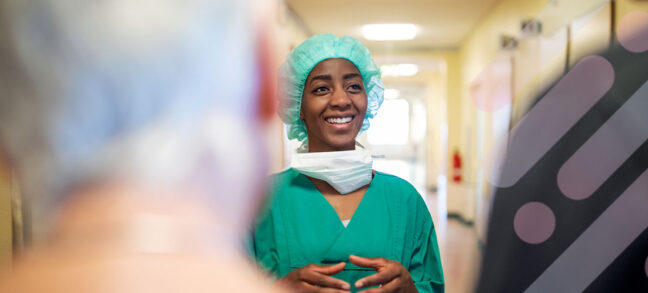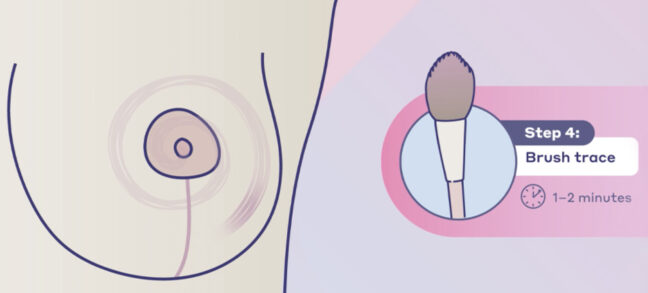While choosing to have a mastectomy is a difficult decision, it’s followed by many other questions. Will you have breast reconstruction? What type will you have? What is recovery like?
As you weigh your reconstruction options, one factor to consider is whether you want to explore the possibility of having sensation restored to your breasts as part of your reconstructive surgery. Women often experience permanent numbness in their breasts post-mastectomy because the nerves in the chest area are severed during the procedure. However, women who choose free flap (autologous) breast reconstruction using their body’s own tissue now have the opportunity to potentially restore sensation with an advanced technique called Resensation.
Resensation is a new technique of breast neurotization, or breast nerve repair, that takes place during breast reconstruction. It uses allograft nerve tissue to help repair nerves that were severed during mastectomy and are now reconnected. Since it is a relatively new procedure, you may be wondering how it works and what recovery is like. The good news is nerve repair has been done in other parts of the body for over a decade, and the recovery process is well understood.
If you’re considering adding Resensation to your breast reconstruction treatment plan, here is what to potentially expect.
How breast neurotization with Resensation works
The nervous system serves as the body’s electrical wiring. Nerves throughout the body carry messages to and from the brain and spinal cord as tiny electrical signals. When breast tissue is removed during a mastectomy, the nerves that supply feeling to the area are severed, disrupting the pathway for sensation and potentially leading to permanent numbness. While some spontaneous return of sensation might occur, usually little to no feeling is regained.1
This lack of sensation not only can lead to severe chest burns or injuries2 because you can’t feel pain, but not being able to fully recover from mastectomy also has long-term impacts on body image and emotional well-being.3 While your breasts may look normal after reconstruction, it’s hard for them to feel like your own when you often can’t physically feel them.
Breast neurotization with Resensation works to potentially restore sensation by reconnecting the nerves severed during mastectomy in the chest with those in the new breast using allograft nerve tissue. The allograft acts like a bridge between the newly reconnected nerves to support growth of new nerve fibers and cells over time. The Resensation technique is currently being offered by a select group of microsurgical plastic surgeons who specialize in breast reconstruction and breast neurotization.

What recovery from breast neurotization with Resensation is like
Breast reconstruction is an intensive surgery, and while healing often takes several weeks, nerve restoration will likely take longer. The reason is that nerves heal slowly, with nerve fibers generally growing at a rate of 1 mm per day, or about 1 inch per month.4
Research on breast nerve restoration has found patients can start to regain some sensation several months after neurotization, and the feelings can continue to grow up to two years later.5
While recovery from breast neurotization does take time, clinical studies show women who have the procedure experience more sensation and they experience it more quickly than women who do not.6 Those who choose breast nerve repair as part of their reconstruction also report a higher quality of life.7
Additionally, a study shows women who had breast reconstruction with nerve restoration reported better physical function, general health, and emotional and social well-being.8 The body image questionnaire that was part of this study also found women who restored sensation had better body image based on several measurements. These included feeling less stigma about their body, less vulnerability to illness or cancer, and fewer limitations than women who did not.
As with any type of breast reconstruction surgery, your doctor will give you instructions on how to take care of yourself following discharge from the hospital. According to the American Cancer Society, it’s important to follow your doctor’s advice on wound and drain care and ask any questions you have prior to surgery, such as what support garments you should wear or when you can begin gentle exercise.9 If you have further questions or concerns after surgery, ask someone on your cancer care team.
To find out if you may be a candidate for breast neurotization with Resensation, download the patient education guide here.
_________________________
1https://www.ncbi.nlm.nih.gov/pubmed/28687258
2https://journals.lww.com/prsgo/fulltext/2016/10000/Thermal_Injury_to_Reconstructed_Breasts_from.8.aspx
3https://www.ncbi.nlm.nih.gov/pmc/articles/PMC5351438/
4http://nerve.wustl.edu/NerveInjury.pdf
5https://www.ncbi.nlm.nih.gov/pmc/articles/PMC4186303/
6https://www.jprasurg.com/article/S1748-6815(17)30173-0/fulltext
7https://www.ncbi.nlm.nih.gov/pmc/articles/PMC5807496/
8https://www.ncbi.nlm.nih.gov/pmc/articles/PMC4995882/
9https://www.cancer.org/cancer/breast-cancer/reconstruction-surgery/what-to-expect-after-breast-reconstruction-surgery.html
Resensation Articles

How does mastectomy impact the nerves in the breast?
One sometimes overlooked aspect of mastectomy is its impact on nerves. Read what happens to nerves during mastectomy and explore…
Read More
What happens during implant breast reconstruction with Resensation®?
By repairing sensory nerves, Resensation® enables you to potentially regain sensation to your chest. Read how this procedure works during…
Read More
how resensation® helped Leanna feel secure in her family’s future
With Resensation®, Leanna can be there to watch her kids grow up—without losing the feeling of being whole.
Read More
post-surgery sensory retraining: instructions and video guide
Sensory retraining is a series of exercises designed to help you reconnect with your body after breast reconstruction with Resensation®.
Read More